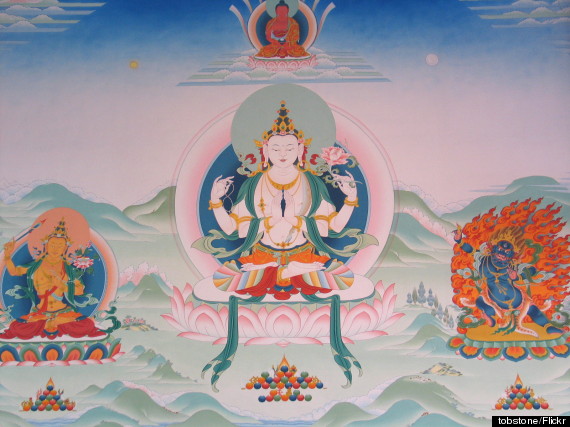
Ralph Waldo Emerson called the Bhagavad Gita, an ancient Hindu text written around 500 B.C., "the first of books" and "the voice of an old intelligence."
It's difficult to overestimate the impact of this seminal text, which is commonly regarded as one of the most significant works in Indian history. Beyond India, the timeless lessons of the Gita ("Song of the Lord") have captivated generations of Hindu and non-Hindu readers in the U.S. and around the world.
Henry David Thoreau, also an early student of Eastern philosophy and commonly cited to be America's first yogi, said of the text: "In the morning I bathe my intellect in the stupendous and cosmogonal philosophy of the Bhagavad-Gita... in comparison with which our modern world and its literature seems puny and trivial."
The Gita is the climax of the Mahabarta, an ancient Hindu scripture comprised of 20 epic poems (and often exceeding 6,000 pages in modern translations), which tells the story of a warrior and his dialogue with his divine guide Lord Krishna on the eve of a battle. It is both a practical guide to living a spiritual life and a comprehensive look at the nature of life and God in Hindu philosophy. And no matter what your belief system or life circumstances -- other Western thinkers who have raved about the text include Albert Einstein and Aldous Huxley, for example -- the wisdom of the ancient text may give you insight into living with purpose.
"The philosophy of the Gita is one that turns out to be especially suitable to us in the West, because instead of encouraging us to turn away from the world, it turns our lives in the world into spiritual work," editor Marlene Roeder wrote in the foreword to spiritual leader Ram Dass's guide to the Gita, Paths to God.
Here are five important modern-day life lessons from the ancient text that, in the words of Einstein, makes "everything else seem superfluous."
What goes around comes around.

The law of karma -- cause and effect, or action and reaction -- is integral to Hindu philosophy. It's also one of the central themes of the Gita, which suggests that each individual -- either in this life or a future one -- will reap what they sow. Even if you don't believe in reincarnation, the law of karma can help you live well in this life.
“No one who does good work will ever come to a bad end, either here or in the world to come," writes the Gita's author.
The idea of karma can be individually empowering insofar as it suggests that we are all responsible for our own thoughts, words and actions, and thus control our own karma. According to the Gita, if we live in accordance with what is right, the dharma, we will create good karma for ourselves and be justly rewarded.
A peaceful mind (and happiness) can be cultivated through practice.

The Gita presents the various types of yoga (meaning "union with the divine") as a path to liberating the mind to achieve serenity and ultimately self-realization. A yoga practice can help us to overcome the tyranny of thoughts and distractions if we are dedicated in our efforts.
“The happiness which comes from long practice, which leads to the end of suffering, which at first is like poison, but at last like nectar -- this kind of happiness arises from the serenity of one's own mind,” says the Gita.
Krishna extolls the benefits of yoga to Arjuna as a practice that will allow him to steady the mind and overcome his indecision and inability to act when he is torn between competing loyalties. But yoga isn't just postures and breathing exercises, as we so often think of it today: It also has to do with living one's life with wisdom, cultivating a conscious community, and living in harmony with the dharma.
It's how you act and treat people every day that matters.

One of the three main types of yoga presented in the Gita is karma yoga, the "path of action," which is the path that Lord Krishna advises for Arjuna. Yoga is "skill in action," according to Krishna. And acting with kindness and compassion towards others is its own reward in that it creates a serene state of mind and puts one on the path to self-realization.
A wonderful message of the text is that self-realization, or awakening, is not the result of being blessed by God or foregoing the material world to spend our days meditating in the Himalayas. We can achieve self-realization by being and acting in the world. When we act without attachments and treat all beings with compassion, we will one day become "unmoved by pleasure or pain."
It's important to question your habitual thoughts and attitudes.

The Gita is a story of awakening and letting go of the ego's control, shedding layers of ego identification. In order to do this -- to unify the fragmented parts of the self and gradually transcend the ego -- we must let go of our habitual ways of thinking about the world and our place in it.
"The process of awakening brings you into a struggle with every habitual way you have of thinking about the universe, even the deepest ones, because every one of them has locked you into some facet of who you think you are," writes Dass in Paths To God: Living The Bhagavad Gita. "That doesn't mean you have to give up everything at once; we can give up things as we come to not need them as badly anymore."
Self-realization is the end and aim of human life.

“It is better to live your own destiny imperfectly than to live an imitation of somebody else's life with perfection," states the Gita.
If you take one thing from the reading of this text, it's to be true to your innermost self. Living one's life authentically is the path to self-realization, which in Hindu philosophy, is the ultimate end and aim of human existence. To truly know the self is, in effect, to know God.
"The subject matter of Eastern philosophy leads the student through a systematic way of directly experiencing the truths of existence and the heights of Self-realization," Swami Rama writes in The Perennial Psychology of the Bhagavad Gita. "After realizing one's real Self, one knows that this Self is the Self of all."
